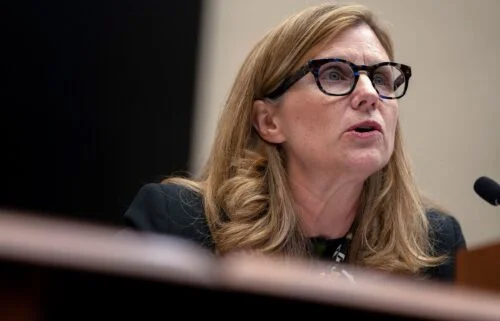Harvard president apologizes for her problematic testimony on antisemitism hearing, acknowledging the impact of words
Harvard University’s president, Claudine Gay, issued an apology in an interview with The Harvard Crimson following the widespread backlash over her controversial congressional testimony. During the hearing, she and other university presidents faced criticism for not explicitly categorizing calls for the genocide of Jewish people as bullying and harassment on campus.
In her apology, Gay stated, “I am sorry,” emphasizing the significance of words. The expression of regret occurred shortly after she, along with the presidents of the University of Pennsylvania and MIT, testified at a House committee hearing on campus antisemitism. They were criticized for not taking sufficient measures to ensure the safety of Jewish students and others at their respective institutions.
Harvard, UPenn, and MIT, along with several other US academic institutions, are facing criticism for perceived inaction against antisemitism on their campuses, particularly in the aftermath of the October 7 Hamas terror attack on Israel and the ensuing conflict. At UPenn, President Liz Magill is under significant pressure to resign, with major donors and others expressing a loss of confidence in her leadership. Harvard is one of 14 colleges currently under investigation by the Department of Education for “discrimination involving shared ancestry” since the October attacks.
In the House hearing on Tuesday, Harvard’s president, along with the presidents of UPenn and MIT, refrained from explicitly stating that advocating for the genocide of Jews would automatically breach their code of conduct regarding bullying or harassment. Instead, they indicated that the assessment would hinge on specific circumstances and behavior.
Gay expressed remorse for her statements in an interview with The Crimson, acknowledging, “When words intensify distress and pain, I don’t see how one could feel anything but regret.”
“I became entangled in what had evolved into a prolonged, confrontational dialogue about policies and procedures,” Gay explained to the newspaper. “In that moment, I should have had the presence of mind to revert to my core conviction, which is that calls for violence against our Jewish community, threats to our Jewish students, have no place at Harvard and will never go unchallenged.”
“Substantively, I failed to communicate what is my truth,” she added. The Harvard president acknowledged hearing about the considerable distress students have experienced in recent months. “To realize that something I said contributed to that pain — that’s truly challenging,” Gay expressed to The Crimson. “It makes me sad.”
Flood of criticism
Gay has encountered numerous demands for her resignation, notably from hedge fund billionaire Bill Ackman, a Harvard alum who has been a vocal critic of how universities handle antisemitism on campus.
“In the entire hearing, the three acted as antagonistic witnesses,” Ackman expressed in a post on X earlier this week. “They displayed a deep disdain for Congress with their smiles and smirks, and outright refusal to provide straightforward yes or no answers to basic questions.”
“They should all step down in disgrace,” Ackman insisted.
However, the criticism from donors, politicians, alumni, and business leaders has predominantly been directed at UPenn’s Magill, who appears to be most immediately at risk of losing her job. She is confronting a donor revolt, including a threat from one donor to withdraw a $100 million gift. Additionally, the Wharton board has expressed its desire for Magill’s removal.
Highlighting the dissatisfaction with the testimony of the three university presidents, a bipartisan group of over 70 US lawmakers sent a letter to board members of all three universities on Friday, demanding the dismissal of Gay and the presidents of UPenn and MIT. The lawmakers insisted, “Given this moment of crisis, we demand that your boards immediately remove each of these presidents from their positions and that you provide an actionable plan to ensure that Jewish and Israeli students, teachers, and faculty are safe on your campuses.”
“The responses of the university presidents to questions addressing the escalating trend of antisemitism on college and university campuses were deplorable,” added the bipartisan group.
Similar to Gay, Magill clarified her statements on Wednesday, a day after the contentious testimony. In a brief video, Magill acknowledged that she should have been more emphatic in condemning hate speech, especially calls for genocide.
“I was not focused on – but I should have been – the undeniable fact that a call for genocide of Jewish people is a call for some of the most terrible violence human beings can perpetrate. It’s evil. Plain and simple,” Magill stated in a video posted on X. “I want to be clear: A call for genocide of Jewish people… would be harassment or intimidation.”
Unlike Gay, however, Magill has not issued an apology for her testimony.
Credit: CNN
